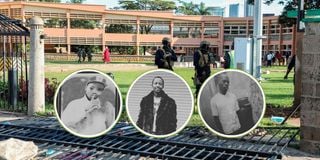Premium
100 days of rage: Plea by mothers of youths killed during protests

Part of the Parliament's parameter fence that was pulled down by protesters during the anti-government protests on June 25, 2024. Inset: Kenneth Njeru, Erickson Kyallo and Kelvin Odhiambo.
What you need to know:
- Three mothers share their grief and unanswered questions over their children's death.
- The open letter is more than just a recounting of personal loss; it is a cry for justice.
Mothers of victims of the anti-Finance Bill 2024 protests are calling for their children to be honoured during the Mashujaa Day, on the 100th day since the protests that changed everything.
The mothers of Kenneth Njeru, Kelvin Odhiambo, and Erickson Kyallo have, in a heart-wrenching open letter that cuts through the silence left behind by the tragic events of June 25, told of the profound grief, unanswered questions, and unwavering hope for justice that now define their lives.
Their sons, like many others, were part of the historic protests that demanded accountability, justice, and a better future. But for these mothers, what began as a movement for change ended in unimaginable loss.
For these mothers, the public holiday should not just be about political speeches or forgotten promises — it should be about remembering the sons and daughters whose lives were cut short.
“We did not send them, we did not request,” the mothers write.
“My son saw how hard I worked, day and night, and in his twenties, he was already supporting as a young breadwinner at the butchery where he worked.”
The letter goes on: “Fellow Kenyans, as we celebrate Mashujaa Day, let us engrave this day into our hearts and minds. Let us demand a monument to immortalize these brave souls, who fought for the Constitution to be upheld. This must become the reason we gather every year on Mashujaa Day — to honor their sacrifice and to remind ourselves that we will not stop until a better future is realised.”
The protests, for young people like Kenneth, Kelvin, and Erickson, were not just about politics — they were about securing a future.
"They did something they have never done before; we have never seen before," the mothers reflect, remembering the powerful sight of their children standing up in defiance, demanding change outside Parliament.
But as the perimeter walls came down, so too did their hopes for a peaceful resolution.
"The gunshots started, and we saw young men going down and blood on streets," they write, vividly recounting the violence that erupted. The confusion of that day still haunts them.
But the open letter is more than just a recounting of personal loss; it is a cry for justice.
The mothers recall the terrifying days when people disappeared without a trace, abducted by rogue forces with no accountability.
“I never thought I would see those days again,” they write.
“I hoped that the constitution would protect my child, to never have to live in an era of torture chambers, fear of expression, association or movement.”
But now, as the letter painfully points out, their children’s bodies are turning up in mortuaries, some mutilated and dumped in swamps.
"To date, we have had no one tell us who did this, and no one pay," the mother state.
Human rights groups said deaths resulting from anti-government protests were 50, as of June 2024, and the numbers were bound to rise.
“Money can never bring back life,” the mothers admit.
But what they fear more than the loss itself is the sense that their government does not care.
They reference the tragic deaths of children at Hillside Academy Endarasha, where 21 died as a result of the fire that razed the boys’ dormitory at the institution.
“This was beyond comprehension for any parent, and yet, the school reopens without answers, without justice.”





